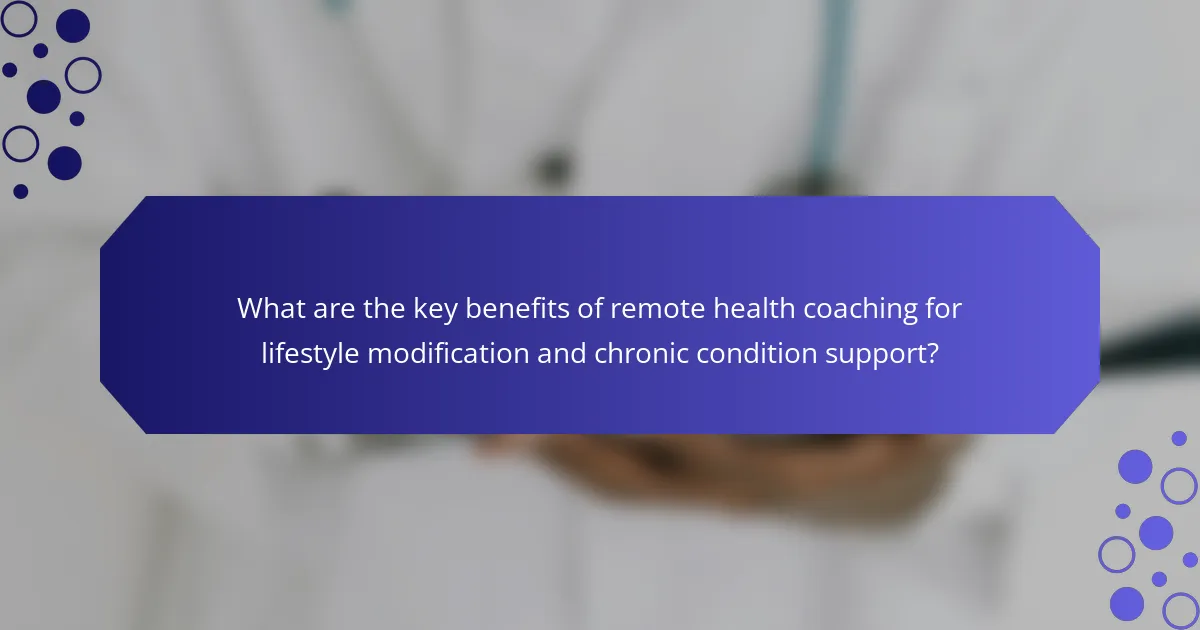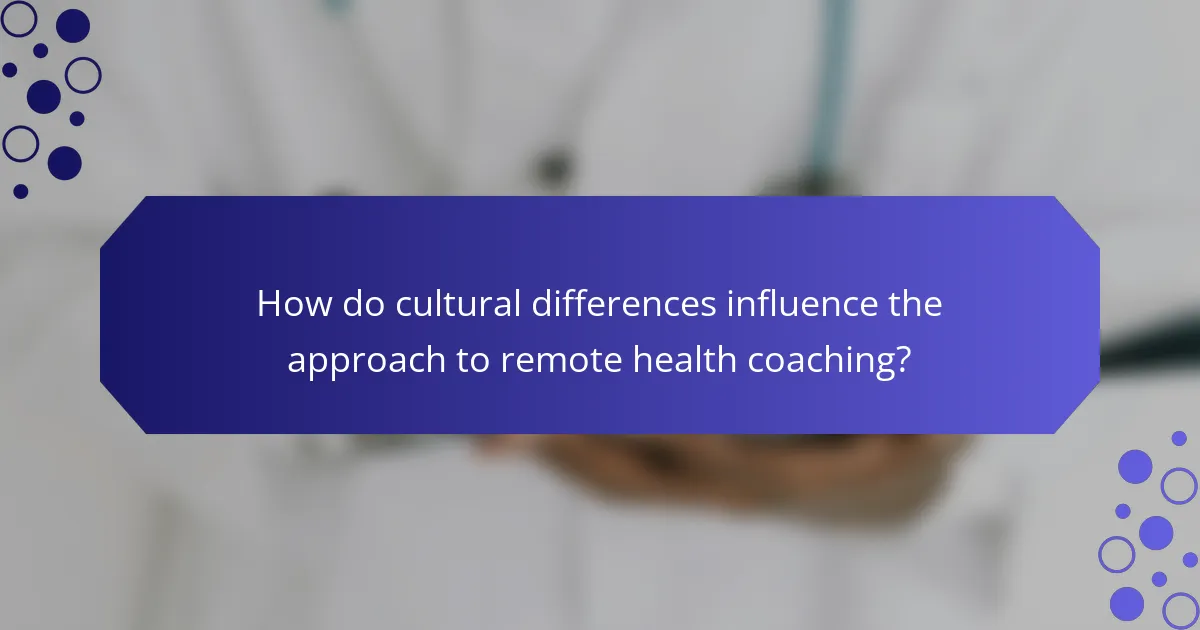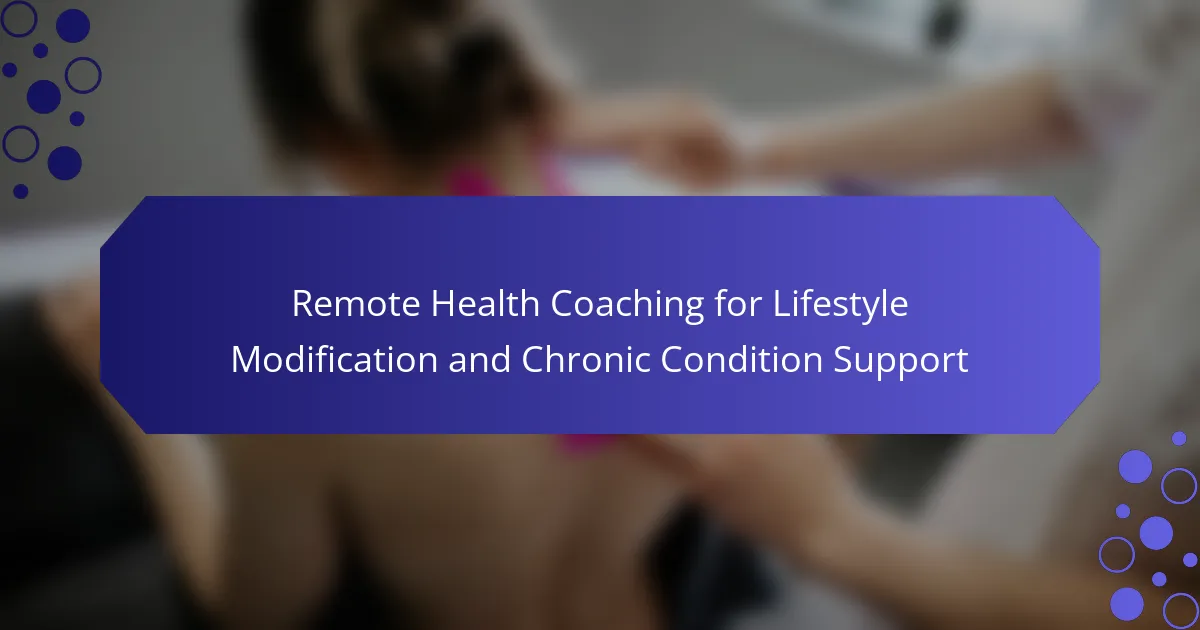Remote health coaching significantly enhances lifestyle modification and chronic condition support by providing personalised guidance and accountability. It offers convenient access to healthcare professionals, improving adherence to health plans. The integration of technology allows for real-time tracking of health metrics, fostering motivation. Cultural considerations and tailored strategies further enhance client engagement and satisfaction.

What are the key benefits of remote health coaching for lifestyle modification and chronic condition support?
Remote health coaching offers significant benefits for lifestyle modification and chronic condition support. It provides personalised guidance, accountability, and flexible access to healthcare professionals.
One key benefit is improved adherence to health plans. Studies show that individuals engaged in remote coaching are 50% more likely to follow their prescribed lifestyle changes. Additionally, remote coaching enhances access to expert advice, allowing individuals to receive support regardless of geographical barriers.
Another advantage is the convenience of scheduling. Clients can engage in coaching sessions from home, eliminating travel time and costs. This accessibility fosters a more consistent engagement, which is crucial for long-term success in managing chronic conditions.
Lastly, remote health coaching often incorporates technology, such as apps and wearable devices. These tools enable real-time tracking of health metrics, providing immediate feedback and motivation, which can lead to better health outcomes.
How does remote health coaching improve accountability and motivation?
Remote health coaching enhances accountability and motivation through personalised support and structured feedback. Clients receive tailored strategies that align with their goals, fostering a sense of responsibility. Regular check-ins and progress tracking create a framework that encourages adherence to lifestyle modifications. This consistent interaction helps individuals stay motivated, as they can celebrate small victories and adjust plans as needed. Additionally, the convenience of remote sessions removes barriers to access, making it easier for clients to engage consistently and effectively.
What role does personalised feedback play in effective coaching?
Personalised feedback is crucial in remote health coaching as it enhances motivation and accountability. Tailored insights allow coaches to address individual challenges, leading to more effective lifestyle modifications. This approach fosters a supportive relationship, enabling clients to better manage chronic conditions. Regular, customised feedback can significantly improve adherence to health plans, ultimately resulting in better health outcomes.
Which chronic conditions can be effectively managed through remote coaching?
Remote coaching effectively manages conditions such as diabetes, hypertension, obesity, asthma, anxiety, and depression. These chronic conditions benefit from personalised lifestyle modifications and continuous support. For instance, studies indicate that remote coaching can improve glycemic control in diabetes patients by enhancing dietary adherence and physical activity. Additionally, individuals with hypertension often experience better blood pressure management through regular monitoring and coaching.
How does technology enhance the coaching experience?
Technology significantly enhances the coaching experience by providing personalised support and real-time feedback. Remote health coaching utilises digital platforms to facilitate communication between coaches and clients, enabling continuous engagement.
Wearable devices track health metrics, allowing coaches to tailor programmes based on individual progress. Video conferencing tools foster face-to-face interactions, enhancing accountability and motivation.
Additionally, data analytics help identify trends and areas for improvement, ensuring that lifestyle modifications are effective. By leveraging these technologies, clients receive a more interactive and supportive coaching experience, ultimately leading to better health outcomes.

What challenges do clients face in remote health coaching?
Clients face challenges in remote health coaching, including limited access to technology, lack of personal interaction, and difficulty in maintaining motivation. These factors can hinder effective lifestyle modification and chronic condition support. Additionally, clients may struggle with understanding complex health information without face-to-face guidance. Communication barriers can also arise, impacting the coaching relationship and overall outcomes.
How can communication barriers impact coaching outcomes?
Communication barriers can significantly hinder coaching outcomes in remote health coaching. These barriers can lead to misunderstandings, decreased engagement, and ineffective support. For instance, technology issues may disrupt communication flow, causing frustration and disengagement. Additionally, cultural differences can impact how messages are interpreted, potentially leading to misaligned goals. Effective communication strategies, such as using clear language and active listening, are essential for overcoming these barriers and enhancing the coaching experience.
What common misconceptions exist about remote health coaching?
Common misconceptions about remote health coaching include the belief that it lacks personalisation, is less effective than in-person coaching, and is only suitable for tech-savvy individuals. Many assume remote coaching provides generic advice, but tailored plans are often developed based on individual needs. Additionally, studies show remote coaching can yield similar or even better outcomes for lifestyle modifications and chronic condition management compared to traditional methods. Finally, while technology is involved, many platforms are user-friendly, accommodating a wide range of comfort levels with digital tools.
How do clients perceive the effectiveness of virtual sessions compared to in-person meetings?
Clients generally perceive virtual sessions as equally effective as in-person meetings for remote health coaching. They appreciate flexibility and accessibility, allowing them to engage in lifestyle modification and chronic condition support from home. Studies indicate that 70% of clients report satisfaction with virtual formats, citing convenience and comfort as key benefits. Additionally, virtual sessions often facilitate more frequent interactions, enhancing ongoing support and accountability.

What strategies can be employed to enhance client engagement in remote health coaching?
To enhance client engagement in remote health coaching, employ personalised communication, interactive tools, and regular feedback. Tailoring approaches to individual needs fosters connection and accountability. Utilising video conferencing and mobile apps increases interaction and motivation. Setting measurable goals and celebrating achievements builds a sense of progress and commitment.
Which digital tools are most effective for maintaining client interaction?
Video conferencing tools, messaging apps, and health tracking platforms are most effective for maintaining client interaction in remote health coaching. These tools enhance communication and provide real-time support for lifestyle modification and chronic condition management.
Video conferencing tools like Zoom enable face-to-face interactions, fostering stronger relationships. Messaging apps such as WhatsApp facilitate quick communication, allowing coaches to provide timely feedback. Health tracking platforms, like MyFitnessPal, help clients monitor their progress and share data with coaches for personalised guidance.
Using these digital tools ensures continuous engagement, essential for successful health coaching outcomes. Regular interaction through these platforms can lead to better adherence to lifestyle changes and improved health metrics.
How can setting realistic goals improve client commitment?
Setting realistic goals enhances client commitment by fostering achievable expectations. Clients are more likely to stay engaged when they see measurable progress. This approach builds confidence and motivation, leading to sustained participation in remote health coaching programmes. Research shows that specific, attainable goals can improve adherence rates by up to 50%. By focusing on incremental changes, clients experience success, reinforcing their commitment to lifestyle modifications and chronic condition management.
What role does community support play in the coaching process?
Community support is vital in the coaching process as it enhances motivation and accountability. It fosters a sense of belonging, which can lead to greater commitment to lifestyle modifications. Engaging with a supportive network provides emotional encouragement and shared experiences, helping individuals manage chronic conditions more effectively. Studies show that participants in community-supported coaching programmes report higher success rates in achieving health goals compared to those without such support. This collaborative environment not only facilitates knowledge exchange but also builds resilience and persistence in overcoming challenges.

How do cultural differences influence the approach to remote health coaching?
Cultural differences significantly influence remote health coaching approaches by shaping communication, motivation, and engagement strategies. Coaches must adapt their methods to align with cultural values and beliefs. For instance, individualistic cultures may favour personalised coaching, while collectivist cultures might prioritise group support. Understanding cultural nuances enhances relationship building and fosters trust, leading to better adherence to lifestyle modifications and chronic condition management. Additionally, language barriers and differing health perceptions can affect the effectiveness of coaching interventions. Tailoring strategies to cultural contexts improves outcomes and client satisfaction in remote health coaching.
What regional variations exist in health beliefs and practices?
Regional variations in health beliefs and practices significantly influence remote health coaching. Different cultures prioritise unique approaches to lifestyle modification and chronic condition support.
For example, in some regions, traditional medicine is favoured, while others emphasise evidence-based practices. This can affect the acceptance of health coaching methods.
Moreover, dietary habits vary widely, impacting lifestyle modifications recommended by coaches. In Mediterranean areas, a focus on plant-based diets contrasts with high-protein diets in other regions.
Understanding these variations enhances the effectiveness of remote health coaching by tailoring strategies to align with local beliefs and practices.
How can coaches adapt their methods to meet diverse client needs?
Coaches can adapt their methods by personalising approaches based on individual client needs. They should assess clients’ preferences, learning styles, and specific health conditions to tailor support effectively.
Utilising technology enhances communication and engagement. Coaches can offer virtual check-ins, interactive tools, and personalised resources to accommodate diverse lifestyles.
Incorporating motivational interviewing techniques can help clients feel more empowered. This method encourages clients to express their goals and challenges, fostering a collaborative coaching relationship.
Lastly, ongoing feedback is crucial. Coaches should regularly evaluate clients’ progress and adjust strategies to ensure they remain effective and relevant to each client’s evolving needs.

What are the unique attributes of successful remote health coaching programmes?
Successful remote health coaching programmes feature personalised plans, continuous support, and measurable outcomes. They prioritise client engagement and adaptability to individual needs. Unique attributes include the integration of technology for real-time monitoring and feedback, fostering accountability through community support, and the provision of holistic resources addressing mental and emotional health. These elements contribute to effective lifestyle modification and chronic condition management.
How do tailored nutrition plans enhance coaching effectiveness?
Tailored nutrition plans significantly enhance coaching effectiveness by providing personalised guidance that aligns with individual health goals. These plans address specific dietary needs, improve adherence, and foster accountability in remote health coaching.
By customising nutrition strategies, coaches can better support clients managing chronic conditions. For example, a tailored approach can incorporate unique attributes such as food preferences and lifestyle factors, leading to improved outcomes.
Additionally, clients are more likely to engage with a plan that considers their unique circumstances, resulting in higher motivation and sustained lifestyle modifications. This personalised attention can ultimately lead to better health management and overall well-being.
What is the significance of ongoing education and training for coaches?
Ongoing education and training for coaches is crucial for enhancing their effectiveness and adaptability. It ensures coaches remain informed about the latest health trends, techniques, and research in remote health coaching. Continuous learning improves their ability to support clients with lifestyle modifications and chronic conditions, ultimately leading to better health outcomes. Additionally, it fosters professional growth and strengthens client-coach relationships by building trust and expertise.

What are the emerging trends in remote health coaching for 2025?
Emerging trends in remote health coaching for 2025 include personalised AI-driven programmes, increased integration of wearable technology, and a focus on mental wellness. These advancements enhance lifestyle modification and chronic condition support through tailored interventions.
AI-driven programmes analyse user data to create customised health plans, improving engagement and outcomes. Wearable technology tracks vital signs and physical activity, providing real-time feedback to both users and coaches. The emphasis on mental wellness addresses the psychological aspects of health, fostering holistic approaches to lifestyle changes.
Additionally, community support networks are gaining traction, allowing individuals to connect with peers for motivation and accountability. As a result, remote health coaching is evolving into a more comprehensive solution for managing health and wellness in 2025.
How is artificial intelligence shaping the future of health coaching?
Artificial intelligence is revolutionising remote health coaching by personalising lifestyle modification and chronic condition support. AI analyses user data to tailor coaching strategies, enhancing engagement and effectiveness.
AI-driven platforms provide real-time feedback, adapting recommendations based on individual progress. This dynamic approach increases accountability and motivation, leading to better health outcomes.
Additionally, AI can identify patterns in health data, enabling coaches to anticipate challenges and adjust interventions proactively. This predictive capability is particularly beneficial for managing chronic conditions, ensuring timely support.
As a result, the integration of AI in health coaching not only improves the overall user experience but also fosters a more responsive and adaptive coaching environment.
What new platforms are gaining popularity among health coaches?
New platforms gaining popularity among health coaches include telehealth services, mobile apps, and social media groups. These platforms enhance remote health coaching by facilitating lifestyle modification and chronic condition support.
Telehealth services provide real-time consultations, enabling personalised guidance. Mobile apps offer tools for tracking progress and setting goals. Social media groups foster community support, allowing coaches to connect with clients and share resources effectively.
The rise of these platforms reflects a shift towards accessible and interactive health coaching, meeting the needs of diverse clients.
Which innovative techniques are being used to personalise client experiences?
Remote health coaching utilises innovative techniques like personalised assessments, data analytics, and adaptive communication strategies to enhance client experiences. These methods allow coaches to tailor interventions based on individual health metrics, preferences, and progress. For example, using wearable technology, coaches can track real-time data, enabling them to adjust programmes dynamically. Additionally, artificial intelligence analyses client interactions, providing insights that help refine coaching approaches for better engagement and outcomes.

What best practices should clients follow to maximise the benefits of remote health coaching?
Clients should establish clear goals, maintain regular communication, and actively engage with their health coach to maximise the benefits of remote health coaching. Setting specific, measurable objectives ensures focused progress. Regular check-ins foster accountability and motivation. Active participation, such as asking questions and providing feedback, enhances the coaching experience. Utilising technology effectively, like apps for tracking progress, can further support lifestyle modifications and chronic condition management.
How can clients effectively communicate their goals and challenges?
Clients can effectively communicate their goals and challenges by being clear and specific about their needs. They should articulate their lifestyle modifications and chronic condition support objectives.
1. Define clear goals: Clients should specify what they want to achieve, such as weight loss or improved energy levels.
2. Identify challenges: Clients must discuss any obstacles they face, like time constraints or lack of motivation.
3. Provide context: Sharing background information about their health history aids coaches in tailoring support.
4. Use measurable indicators: Clients can mention specific metrics to track progress, such as daily steps or dietary changes.
5. Maintain open communication: Regular check-ins and feedback sessions enhance understanding between clients and coaches.
What common mistakes should clients avoid during their coaching journey?
Clients should avoid unrealistic expectations, lack of communication, and neglecting personal accountability during their coaching journey. Setting achievable goals is essential for progress. Regular check-ins with the coach foster transparency and address challenges promptly. Embracing personal responsibility enhances engagement and commitment to lifestyle modifications.
Which self-monitoring techniques can enhance progress tracking?
Self-monitoring techniques that enhance progress tracking include regular goal setting, utilising mobile health apps, and maintaining a food diary. These methods foster accountability and provide valuable insights into lifestyle changes.
For example, mobile health apps can track physical activity and dietary habits in real-time. A food diary helps identify patterns and triggers related to eating behaviours. Additionally, wearable devices can monitor vital signs and activity levels, offering immediate feedback.
Incorporating these techniques empowers individuals to take charge of their health and make informed decisions, ultimately improving outcomes in remote health coaching for lifestyle modification and chronic condition support.
